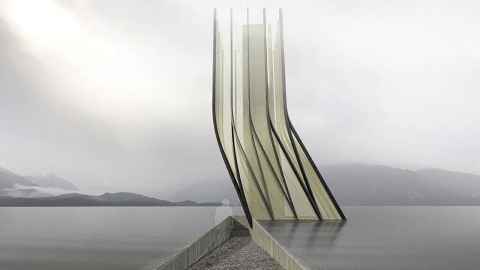Too good to split up: students share top architecture award
11 December 2019
Some famous top prizes have been shared between two winners this year, such as the Booker prize for literature, but closer to home that also now includes the New Zealand Institute of Architecture Student Design Awards.

The annual national competition is contested by final-year students from New Zealand’s three schools of architecture, but for the first time the NZIA has awarded it to two students, Abdallah Alayan and Jeremy Priest, both from the University of Auckland School of Architecture and Planning.
Institute of Architects president Tim Melville, convenor of the awards jury, said it was impossible to separate the winning entries.
“The two winning projects are very different but equally meritorious,” he said. “They are highly accomplished pieces of work that illustrate architecture’s ability to respond to social and political conditions, identify issues and offer solutions.”
Mr Melville noted that Abdallah had demonstrated particular personal resilience to complete a high-quality project in the year in which his older brother, Atta, lost his life in the Christchurch mosque killings.
He described Abdallah's project as featuring the architecture of “special moments – designed for an age in which most people have no allegiance to a particular religion but retain the capacity to be awestruck by nature”.
We all have bodies, I believe we all have souls, and it’s a fact that we all live on one earth. The beauty of places like Fiordland help us to realise how lucky we are to be here together

Abdallah’s project proposed an architectural pilgrimage trail in Fiordland, with four non-denominational pilgrimage structures on a trail from Te Anau to Milford Sound, which the judges said made a sophisticated and timely case for tolerance and mutual respect “expressed with clarity and sensitivity, premised on inclusivity and inspired with optimism”.
Abdallah agrees that the terror attack, that cost the lives of 51 Muslim worshippers, encouraged him to explore the potential of architecture to draw attention to and articulate what we have in common rather than what separates us.
“The loss of my brother on that Friday made it clear to me that focusing on what unites us isn’t just necessary, it’s urgent. With that in mind, I made it my task to generate spaces that articulate the many things our bodies and spirits share in common.
“The way these spaces extract religious references and make them accessible and enjoyable, while creating a dialogue with the incredible landscapes that surround them, articulates one clear message: that we’re all fundamentally united.
“We all have bodies, I believe we all have souls, and it’s a fact that we all live on one earth. The beauty of places like Fiordland helps us realise how lucky we are to be here together.”
Social commentary and a concern with environmental issues characterised many of the entries by the other ten finalists in the 2019 Student Design Awards.
In the other winning entry, Jeremy Priest channelled his protest at the closure of the University’s Architecture Library with the design of a modern learning environment for architectural students.
“Jeremy’s design mixes dissent and satire with a positive proscription for teaching spaces that reflect the realities of contemporary architectural education and practice,” Mr Melville said.
Maito Akiyama, also of the University of Auckland, highlighted New Zealand’s binge-drinking culture in his scheme for a series of “inebration stations” on Queen Street, while his classmate Nicole Teh proposed turning a Point Chevalier petrol station and fast-food outlets into a facility for repurposing recycled goods.
Both Abdallah and Jeremy received a $5,000 cash prize and $1,500 travel grant as their winning prizes.
Media contact
Margo White | Media Adviser
Communications Office
Tel: 09 923 5504
Mob: 021 926 408
Email: margo.white@auckland.ac.nz